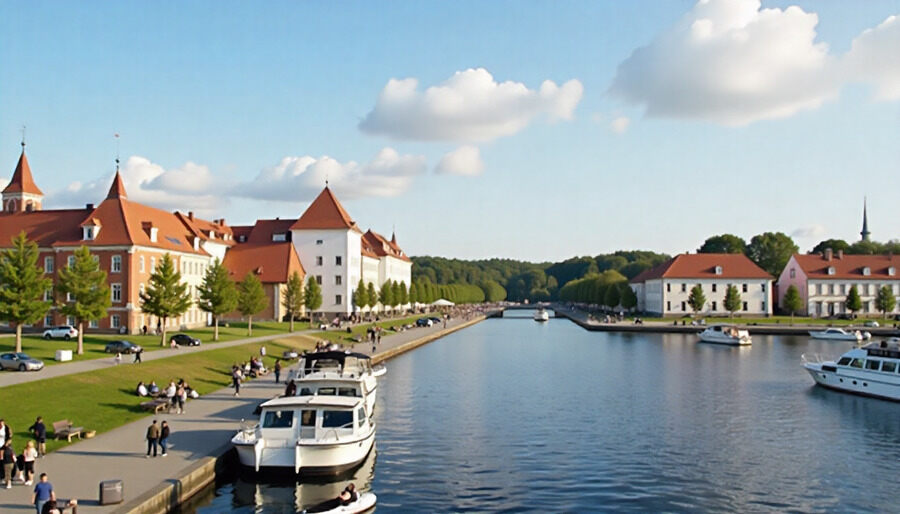Published on
October 13, 2025
The tourism industry across Latvia, Lithuania, and Estonia is on the brink of a historic transformation. Baltic World, a fast-growing regional tour operator, has taken a decisive step toward merging with Novaturas Group, a long-established travel company with deep roots across the Baltics. The proposed merger, now under review by the Competition Council, could redefine the landscape of organized travel in Northern Europe—combining scale, innovation, and efficiency into one powerful network.
Under regulatory procedures, the Council must reach its initial decision within one month of receiving the merger notification, determining whether to approve, restrict, or block the transaction. If a more detailed investigation is required, the review period could extend to four months. The outcome will determine not only the structure of the Baltic tourism market but also how the region positions itself on the global travel map in the years ahead.
Baltic World: Ambition, Growth, and Modernization
Founded in 2022, Baltic World has emerged as a dynamic and rapidly expanding company that designs and operates package holidays spanning flights, accommodations, local transfers, and guided experiences. Its reach extends across all three Baltic nations, serving travelers who seek curated journeys that balance cultural discovery with modern convenience.
According to Firmas.lv data, Baltic World recorded a turnover of €73.967 million in 2024 and achieved a profit of €373,163, a remarkable performance for a relatively new player in the industry. The company, owned by the Netherlands-based Set Travel B.V., continues to build on a business model rooted in efficiency, customer service, and strategic regional connectivity.
This solid foundation has allowed Baltic World to challenge traditional players and establish itself as a competitive force in the travel market. Its potential merger with Novaturas is viewed as a natural evolution—uniting Baltic World’s agility with Novaturas’ extensive market presence and resources.
Novaturas: A Cornerstone of Baltic Tourism
For over two decades, Novaturas has been a central pillar of tourism across Latvia, Lithuania, and Estonia. The company’s operations span a broad portfolio of destinations, offering travelers complete holiday packages that integrate air travel, hotels, transfers, and excursions.
Listed on the Vilnius Stock Exchange, Novaturas has maintained its reputation as one of the Baltics’ most trusted travel brands. In 2024, it reported €42.8 million in revenues from Latvia, €110.7 million from Lithuania, and €47.4 million from Estonia. However, despite its scale and reach, the company closed the year with a €7.604 million loss, contrasting with its earlier profitability.
The upcoming merger could serve as a strategic reset—introducing new management efficiency, capital strength, and collaborative innovation that would enable Novaturas to regain momentum in a competitive European market.
Strategic Synergy Across the Baltic States
If approved, the merger between Baltic World and Novaturas would mark one of the most significant collaborations in the region’s tourism sector. Both companies share similar operational frameworks, and their integration would open pathways for cost optimization, resource sharing, and unified destination marketing.
By merging their networks and expertise, the combined entity could negotiate stronger partnerships with airlines, hotel groups, and transportation providers. This could lead to broader travel options, more affordable packages, and seamless customer experiences across the Baltic countries. Additionally, the collaboration would create opportunities to introduce new technology-driven booking systems and sustainable travel programs—further aligning the region with global tourism trends.
Such synergy would not only benefit travelers but also reinforce the Baltics’ collective appeal as a distinctive multi-country travel destination—combining scenic coastlines, rich heritage, and modern hospitality within a compact and well-connected region.
Strengthening the Baltic Tourism Identity
Beyond the financial and operational dimensions, the merger carries cultural and economic implications for the Baltic states. Together, the companies could act as ambassadors for regional tourism, promoting the Baltics as a unified travel corridor rather than three separate markets. This integrated approach could enhance destination visibility abroad, attract international partnerships, and encourage greater collaboration among local tourism stakeholders.
With rising demand for sustainable and experience-driven travel, the partnership’s timing could not be more strategic. Travelers are increasingly seeking authentic regional experiences that blend urban sophistication with natural beauty—precisely what the Baltic region offers. A combined operator with expanded resources would be well-positioned to meet these evolving expectations and to promote the Baltics as an essential part of Europe’s tourism circuit.
The Road Ahead for Baltic Tourism
The decision from the Competition Council is now one of the most anticipated developments in the region’s travel sector. Should the merger receive approval, it would set the stage for a Baltic tourism powerhouse—a unified operator capable of competing on the broader European stage while strengthening local economies and tourism infrastructure.
Analysts believe the collaboration would bring greater financial resilience, improved service quality, and enhanced market reach. It could also inspire other tourism-related businesses to pursue similar partnerships, leading to a more consolidated, efficient, and innovative travel ecosystem across Northern Europe.
In an era defined by change, this merger could symbolize a bold step toward a new travel identity for the Baltic states—one that fuses modern business strategy with regional heritage, creating a stronger, more connected tourism future for Latvia, Lithuania, and Estonia.
